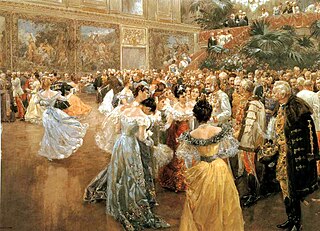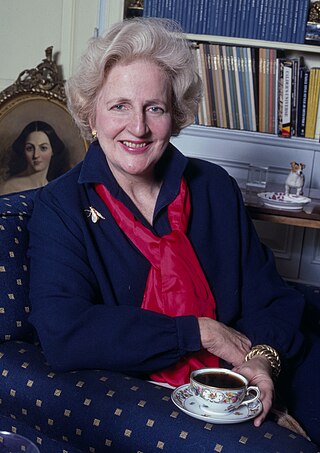
Etiquette is the set of norms of personal behaviour in polite society, usually occurring in the form of an ethical code of the expected and accepted social behaviours that accord with the conventions and norms observed and practised by a society, a social class, or a social group. In modern English usage, the French word étiquette dates from the year 1750.
Ms. or Ms is an English-language honorific used with the last name or full name of a woman, intended as a default form of address for women regardless of marital status. Like Miss and Mrs., the term Ms. has its origins in the female English title once used for all women, Mistress. It originated in the 17th century and was revived into mainstream usage in the 20th century.

Erving Goffman was a Canadian-born American sociologist, social psychologist, and writer, considered by some "the most influential American sociologist of the twentieth century".

Judith Martin, better known by the pen name Miss Manners, is an American columnist, author, and etiquette authority.

A visiting card or a calling card was a small, decorative card that was carried by individuals to present themselves to others. It was a common practice in the 18th and 19th century, particularly among the upper classes, to leave a visiting card when calling on someone.

Emily Post was an American author, novelist, and socialite famous for writing about etiquette.

A tea party is a social gathering event held in the afternoon. For centuries, many societies have cherished drinking tea with companions at noon. Tea parties are considered for formal business meetings, social celebrations or just as an afternoon refreshment.

A tea gown or tea-gown is a woman's dress for informal entertaining at home. These dresses, which became popular around the mid-19th century, are characterized by unstructured lines and light fabrics. Early tea gowns were a European development influenced by Asian clothing and historical approach from the 18th century which led to the renaissance time period of long and flowing sleeves. Part of this European sense of fashion came from the Japanese kimono.

The first dance is an element in a number of traditions, being an opening of a certain dance function: ball, prom, wedding, etc.
Etiquette rules in the United States and Canada generally apply to all individuals, unlike cultures with more formal class structures, such as those with nobility and royalty.

Letitia "Tish" Baldrige was an American etiquette expert, public relations executive and author who was most famous for serving as Jacqueline Kennedy's Social Secretary.

A hat tip, also referred to as tip of the cap, is an act of tipping or doffing one's hat as a cultural expression of recognition, respect, gratitude or simple salutation and acknowledgement between two persons.
A courtesy book was a didactic manual of knowledge for courtiers to handle matters of etiquette, socially acceptable behaviour, and personal morals, with an especial emphasis upon life in a royal court; the genre of courtesy literature dates from the 13th century.
Galateo: The Rules of Polite Behavior by Florentine Giovanni della Casa (1503–56) was published in Venice in 1558. A guide to what one should do and avoid in ordinary social life, this courtesy book of the Renaissance explores subjects such as dress, table manners, and conversation. It became so popular that the title, which refers to the name of one of the author’s distinguished friends, entered into the Italian language as a general term for social etiquette.

Mary Elizabeth Sherwood was an American author and socialite. She wrote short stories, poetry, several books, and etiquette manuals, in addition to contributing to many magazines and translating poems from European languages. Among her writings are The Sarcasm of Destiny, A Transplanted Rose, Manners and Social Usages, Sweet Briar, and Roxobel. Better known as Mrs. John Sherwood, some of her literary works were published as "M.E.W.S." or "M.E.W. Sherwood".

Emily S. Bouton was an American educator, journalist, author and editor. She was educated to become a teacher and took the highest position awarded to any woman as teacher in high school at Toledo, Ohio and Chicago, Illinois, but resigned them to engage on journalistic work on the Toledo Blade, position which she held for many years. She also wrote works on health and beauty for women and one on etiquette, beside pamphlets. She published books, wrote for the newspaper press and served as editor of the "Household", the "Saturday Salad" and the "Home Talk" columns of the Toledo Daily Blade. She was the author of Social Etiquette, Health and Beauty and other works more or less directly relating to women. Bouton died in 1927.

Table manners are the cultural customs and rules of etiquette used while dining. As in other areas of North American etiquette, the rules governing appropriate table manners have changed over time and may differ depending on the setting.
Lizzie Post is an American writer whose opinion on evolving changes in modern manners is frequently cited.
Daniel Post Senning is an American etiquette expert. He is the co-president of the Emily Post Institute, founded by his great-great-grandmother Emily Post.

Lillian Eichler Watson was an American advertising copywriter and author of bestselling books of etiquette. Her first Book of Etiquette, published in 1921 and for which she created the advertising campaign Again She Orders..."A Chicken Salad, Please", was an immediate bestseller and was followed by several updated volumes and numerous other books.














